|
|
About ThemesI personally believe that the Theme of a game, in combination with the Atmosphere, is one of the most important aspects of a game. Theme relates to murder, domination, business, while atmosphere relates to the specific environment. Is there a difference between Atmosphere and Look&Feel? Yes, atmosphere relates to the setting, look&feel relates to the way is it shaped. What you find below is a grab bag of themes, just meant to illustrate the variety of theme's. Should I mention this list is far from complete? Introducing ThemesThe theme could be something like Real Estate or War, the environment could be something like 1980's, Fantansy (orcs/goblins), Future. The atmosphere is an important part here. It can also be a real game blocker though, as some player prefer 'real life situation' rather than running around with goblins and orcs: consider a great game mechanism with lots of appealing aspects in its theme (e.g. a trading game), situated in a hooker & pimps environment: now: you just lost all the attraction to a large market (mmmm, thinking about it, it also attracts a large market). There are various good examples of games where the atmosphere is even more important that the theme / game mechanism. Many games use TV-series / Movies as theme. Look at the many Star Wars, Star Trek etc. games. In most cases, these games are only enjoyable if you like the theme. As a matter of facts, some games are broken, lousy designed or completely boring, but if you are in to the theme, you will buy it and play it. Many of these atmosphere related games use 'old' mechanics and it's wonderfull to see how old games come to live with new themes.
Below you find a game called 'the beverly hillbillies' (Filmway TV Production, 1963) from a famous TV series in '60-s). Please compare the game board to the board of Prince Valliant above: see any resemblance? As said, you don't have to be an inventor to come up with a board, the trick is to make a balanced / entertaining board (pitfalls, traps, chances, luck, etc.).
There are many more (recent) examples, but all these games carry their succes by the popularity of a comic, a tv-series or movie. Themeless games (or nearly themeless)There are a large number of games that have nearly no theme, but still are succesfull. Typical examples are Go, 'mensh argere dich nicht' (aka Parchisi), nearly all standard card games (poker, bridge, etc.), dames, etc.
Many of these games have survived history. Games like Go are as old as history (well, nearly). Another typical themeless game, recently published, is Set!
Recently there have been introduced a large number of themeless games, mainly made out of wood and fiber, usually very such as
Abstract mind games are propably the main portion of themeless games. Think about Go, Reversi, Dames, Mastermind, etc. In general these games have load of puzzling characteristics. The main question arises, when is a game a mind game? A mind game in my opinion is game which involves no luck or propability at all. Clue games
'Atmosphere' is very typical game in this catagory. I'm not quite sure if it belongs here but the suspence of the game should take it to here. This game comes with a video tape, that is being played every once in a while. Another game called ' Scotland Yard' might confuse you, it's not much of a detective game, but more like a chase/racing game. Knowlegde gamesKnowledge is very good ingredient for family games. Trivial Pursuit is the current mother of all knowledge games. As such, this game has many, many spinoffs, usually in specific area's, such as sports, movies, etc.. Other typical variants are 'ripley's believe it or not (MB 1984), I Love Lucy ('1.000 authentic show trivia question', Talicor, 196X), specific area's (Star Wars, Rock & Pop), etc. etc. State the fact (Pressman Toy Corp, 1993) is another example where players need to know all kind of geographical, ecological information (US based, 180 cards) on their trip throughout the USA (roll a dice to progress on your journey). In addition there are the obvious dictionary games ('what does this word mean'), see also 'word games' on this subject. In conclusion, knowlegde games can relate to any subject and are usually socializing games. Although the theme has become a bit boring (too many subjects), these games are still very popular. Word gamesMany family / party games use language as a main component. A typical example is Scrabble, where as players get letters (cards, tiles, ...) and must form words. According to some ruling the player gets a score / points.
Other typical games around words are
WargamesWargames are as old as mankind I guess. Go is actually an abstract wargame where you try to conquer as much space as possible, but the again the type of wargames here discussed are the ones that not the normal mind games (like Chess). It should be noted that War games have a real life purpose. Since mankind, leaders , generals etc. play wargames to sharpen their strategy. Wargames as discussed in this paragraph mean battle but the a realistic piece of luck / fog of war. For the record, if you want to go into wargames, you don't want to miss grognards site. Wargames come basically in two types: board based games and table top based games. The main difference is: in board based games the armies/soldiers move squares / tiles / places, table top games require scenery whereas the armies move by centimetres / inches. Most wargames contain four important components:
The most obvious board-based wargame is Risk. Avalon Hill has propably been accredited to be the most succesfull publisher (taken over by Hasbro). This company has published many historcal scenario's (incl many World War II scenarios) like B-17- queen of the skies, Luftwaffe, Hannibal: Rome vs Carthage, Empire of the Rising Sun, Third Reich, War and Peace, Blitzkrieg, American Civil War Campaign, Ceasar at Alesia, The Russian Campaign Game, Afrika Corps, Battle of the Bulge, Midway, Stalingrad, The Arab/Israeli Wars, Waterloo etc. TSR is another famous Wargaming Company (taking over Hasbro as well). And then off course you can choose between a full scale war or just a naval war, sky war, tank war, etc. [note if you search for Avalon Hill in Ebay, you will get about a 1000 entries listed...] Note that wargames come at various levels, you have the high level wargames, where you command complete countries and games at a more tactical level (e.g. where you operate units or maybe even individual soldies (aka skirmish games)).
Table top wargames are however are even more popular within special 'wargamer'-groups. Table top games involve loads of miniatures, usually very well painted by their owners. The armies move by centimeters and inches. Besides the fact that there are many 'older' wargame players (like my dentist!), young players prefer the fantasy Warhammer games or futuristic Warhammer 40K games. In addition, Warhammer and alike can also be played at the several level (very large armies (Warmaster, small miniatures), units (Warhammer, standard miniatures) and skirmish (like Necromunda and Mordheim). It should be noted that table top wargames are very expensive, especially when it comes to collecting the different miniatures (it's an addition). In addition of wargames, some games really go in to deep political negiotions, like Diplomacy, where as the 'war-aspects' is not really the main mechanic. An interesting phenomen is the fact that rules from more or less basic
wargames are being copied and used in other games. As Chess is propably one of
the 'mothers of all wargames' (Go players, don't flame me!), there are many
variations regarding chess. There are off course various rule-variations, but
there are also many add ons. If you think of warhammer and alike, there are many variations that use the basic warhammer / alike rulings / features. Especially when it comes to miniature wargaming, players tend to introduce their own armies with specific features (usually sanctioned by a gaming club/group). Roleplaying gamesRoleplaying, as one of the themes, is often used in other themes. Most of these games use interaction / negotiation between players as a main mechanic. The basic mechanic of roleplaying is not just 'winning the game', but grow your character in a way he/she can the game, more specificly, creating that character with specific characteristics so it can play in a series of roleplaying games.
These kind of games are usually played by dedicated roleplaying groups. You should be able find these near Universities and dedicated game shops. Advanced Dragons & Dungeons (TSR) is one of the most popular ones, but GW created also a number of these games (heroquest, warhammer quest, space crusade, etc.). The better ones do not have a fixed board game, but tiles that reflect tunnels, rooms, caves, etc. (e.g. advanced heroquest, warhammer quest). Special to mention are roleplaying games in 'real life', where people play role games outdoors, dressed up as soldiers, detectives, etc, but then again, that in not much of board game anymore then? Typical examples are the "how to host a murder"-series. In general, these type of games require a minimum / set number of players. Each player takes role and solve the mystery of the night. Typical settings are dinners, while eating playing the game / solving the mystery. Adventuring / exploration
An example of a more 'real life' roleplaying games in this catagory is 'outdoor survival' (Avalon Hill, 1972), on a board representing 13,200 square miles of woods, rough terrain, mountains, plains, rivers, lakes. Evolution gamesThe theme here is to start a civilization or something alike and build on until you conquer the world (or achive your goal), by war and by economics. I guess the most typical example of this catagory is 'civilization'. Other games that may fall in this catagory are Settlers and its expansion. One should note that games usually combine several facets of 'evolution', the contain wargaming, economics, logistics and more of these kind ingredient. The better games in this catagory are the ones that demand negotiation / trade. Business gamesThese type of games focus mainly on getting business success. Typical examples are monoply, aquire and business. In some business games are combined with other themes, like sports, where the player is some kind of manager of a team. On the more pure business game side we see games like
Some other games that may fall in this catagory are 'Stick the IRS, the tax shelter game' (guess what, another monopoly alike game). As kind of spin off a number of insurance games have been published such as Calamity (Sentry Insurance Group) and 1845 (some Mother Goose alike, from (Nederlanden van 1845, Nationale Nederlanden, ING Group)). Not really in this area, but games concering red tape might interest you as well once you get into business games. Here is one for free form freakfactory. Family gamesMany games have been produced with the idea to involve the whole family. Off course, many word games could be summed up here as well. The games below Twister: very physical game, where you have to touch several places on the ground at the same time while your team mate / opponent tries the same. Pictionary: one player in a team takes a cards with a word on it, while the other team mates have to guess the word (time-restricted). If the team fails, other teams may take a guess. Then another team takes turn. Think Alike: game based on word association, each member of a team is given six words and must write down the first word that comes to their mind. The other players have to guess each others word. Charade: the famous 'guess the word game, while I'm not allowed to speak'. Training gamesThe ultimate goal of a game: to learn something .... Many games are used in kindergarten etc. These games usually relate to basic skills and basic training (math, geography, shapes, letters, etc.). In addition some games are used within the area of child psychology. Over the last decades, many games were introduced in business area to train employee's skills and/or create teamwork. Also games related to (revealing) personal skills and/or business cases / role playing games have become very popular. Other purposes may be ice breaking and networking. As a matter of fact, this type of game development is very lucrative business area, since not only the game is sold, but it usually comes with consultancy and additional training. I should mention that business or management games are real fun if you have work with new colleagues. Some of the game concepts are really simple, but the interaction is the main fun part. A specific kind of training games is the War Game type, as already mentioned in order train military war fare. A nice movie example is show in The Longest Day (1962, whereas the german generals take of for a 'kriegsspiel' or Wargame (1983)). This type of game was later made available for the regular consumers. Actually H.G. Wells (the writer) is seen as the father of all modern miniature war games. The fun part of all these games: the ultimate goal is not to win, but to gain insight in behavior and skills or to explain processes to the players. Usually these games have a psychological backgrounds and the better ones are developed at universities etc. As a matter of fact these games are very expensive because they are usually customized to the customers wishes. In addition, these games are not for sale in regular shops. And of course, additional consultancy is never cheap.
Religious based games
|
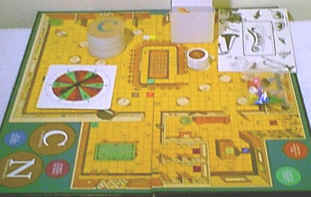 i love lucy, the a team, starsky & hutch, friends, married with
children, simpsons, cheers, love boat, the waltons, miami vice, wwf wrestling, etc.
etc. Special attention here for the show 'cheers' (that
'bar'-comedy). To the right you see the gameboard of that show. I you look
closely, you see that it is actually the layout of the bar
"cheers" as in the show. (btw, I actually own that game as i loved
the show). i love lucy, the a team, starsky & hutch, friends, married with
children, simpsons, cheers, love boat, the waltons, miami vice, wwf wrestling, etc.
etc. Special attention here for the show 'cheers' (that
'bar'-comedy). To the right you see the gameboard of that show. I you look
closely, you see that it is actually the layout of the bar
"cheers" as in the show. (btw, I actually own that game as i loved
the show). | |
| thunderbirds, spiderman, fantastic four, batman, startrek, etc. etc. | |
| all disney movies / characters | |
| harry potter, mad magazine, garfield, etc. | |
| jurrasic park, titanic, queens gambit (star wars), etc. | |
| charlie chaplin, laurel & hardy (1962), beatles, wc fields, kiss on tour, partrigde family (remember those?) | |
| pacman, mrs. pacman, lara croft, donkey kong |
 Some games-theme /
designs really require special credit. How about that great cultural TV serie
Survivor, where some kids where locked up 'real life' on a island and had to
stay there for time, waiting to get voted away by the TV audience. Do you think,
you can make a CCG from that. Yes, you can.
Some games-theme /
designs really require special credit. How about that great cultural TV serie
Survivor, where some kids where locked up 'real life' on a island and had to
stay there for time, waiting to get voted away by the TV audience. Do you think,
you can make a CCG from that. Yes, you can.
 These games usually use very standard mechanics (making it easy for kids to
understand) such as mother goose, snakes and ladders. In the 70's / 80's more games were created based on comics and, actually,
there were some good ones in between. Judge Dredd was leading for a number of
Games Workshop games (and of course the unavoidable miniatures from
GW/Citadel). What makes the games a bit more special than just the game is
the fact that the look and feel of the originator (e.g. a comic) is often very
well copied.
These games usually use very standard mechanics (making it easy for kids to
understand) such as mother goose, snakes and ladders. In the 70's / 80's more games were created based on comics and, actually,
there were some good ones in between. Judge Dredd was leading for a number of
Games Workshop games (and of course the unavoidable miniatures from
GW/Citadel). What makes the games a bit more special than just the game is
the fact that the look and feel of the originator (e.g. a comic) is often very
well copied.
In some cases RPG's have been being published in relation to game shows (typical example: Teenage Mutant Ninja Turtle (Heroes Unlimited, 1985).
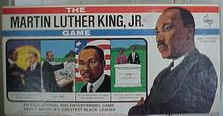 In addition there are
many games around based on real life situation of real people. Typical examples
are Martin Luther King, jr, but also many political based games. Tony Nardo has
a very large collection of games based on US presidents (and politics). Take
a look at that site, it's really impressive (and he is a nice guy too!).
In addition there are
many games around based on real life situation of real people. Typical examples
are Martin Luther King, jr, but also many political based games. Tony Nardo has
a very large collection of games based on US presidents (and politics). Take
a look at that site, it's really impressive (and he is a nice guy too!).
Anti-1977 game of anti-trust laws is another typical example of politics, using the monopoly mechanic to play a anti-kapitalistic game.
Last but not least there are 'the latest fashion'-games. For the 00's this would be games called like 'Girl Power' (for girls 8+) and Sue You (very American I guess)! Games about Tornados, Earthquakes, etc. appear to be popular also very popular, when marketed at the good (hmmm, wrong) moment...
An then, off course, there are the many 'good cause' games, learning you to understand the many troubles about environment, politics, cultures, etc. The bad news here is, none of the games covering these issues, i came across have good mechanics: they are boring and very 'moral'. And that's really too bad (I really tried!!!).
What about an old game using a new atmosphere. Now here are some Monopoly variations:
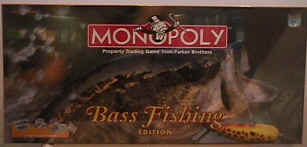 Pokemon, Startrek,
Starwars, Tolkien, any city in the world, any major popular sport, any famous
university in world (Kentucky, Michigan, Tennessee, Texas, etc.), Wizard of Oz, Ford Mustang, etc. etc. Most wierd one I
came across was a monopoly game based on Bass Fishing: can this be true????
Yes it can, just look at the picture on the right.Conclusion: take any
hobby, place, activity, subject and you can make a monopoly game out of it.
I guess there are too many sites around on collecting Monopoly games, so
check those to get a few more idea's. Pokemon, Startrek,
Starwars, Tolkien, any city in the world, any major popular sport, any famous
university in world (Kentucky, Michigan, Tennessee, Texas, etc.), Wizard of Oz, Ford Mustang, etc. etc. Most wierd one I
came across was a monopoly game based on Bass Fishing: can this be true????
Yes it can, just look at the picture on the right.Conclusion: take any
hobby, place, activity, subject and you can make a monopoly game out of it.
I guess there are too many sites around on collecting Monopoly games, so
check those to get a few more idea's. |
And of course there are the anti-monopoly games such as Anti, Mad Magazine, etc.
The many games that been copied in this way are usually the standard family games such as
| trivial pursuit, monopoly, standard card sets, yatzhee |
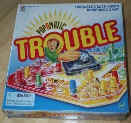
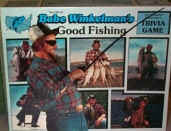 Popomatic
Trouble is typical 'parchise' variant, like many other 'parchisi' look-a-likes.
Other classics that are often copied are Stratego (e.g. Stratego Legends:
stratego with a twist), Chess alike games and many others. While talking
about fishing, how about 'Babe Winkelman's Good Fishing Trivia Game'?
Popomatic
Trouble is typical 'parchise' variant, like many other 'parchisi' look-a-likes.
Other classics that are often copied are Stratego (e.g. Stratego Legends:
stratego with a twist), Chess alike games and many others. While talking
about fishing, how about 'Babe Winkelman's Good Fishing Trivia Game'?
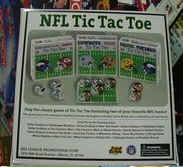 The
most idiotic copy game I came across so far is the 'Dallas Cowboys vs Wash Redkins
TIC TAC TOE', one of many in the NFL Tic Tac Toe series. You know tic-tac-toe?
Now you can play it with the helmets of your favorite NFL team. Lucky you! Like
stated before, you really have to be a true atmosphere fan / collector (in this
case NFL) to enjoy this game. I guess this game beats everything I've seen in
this catagory, but it's propably a good commercial succes in the NFL scene.
The
most idiotic copy game I came across so far is the 'Dallas Cowboys vs Wash Redkins
TIC TAC TOE', one of many in the NFL Tic Tac Toe series. You know tic-tac-toe?
Now you can play it with the helmets of your favorite NFL team. Lucky you! Like
stated before, you really have to be a true atmosphere fan / collector (in this
case NFL) to enjoy this game. I guess this game beats everything I've seen in
this catagory, but it's propably a good commercial succes in the NFL scene.
Another star in this category are all the games based on Star Wars and Star Trek. Except the many Trivial Pursuit / Chess / Monopoly games, there are UNO variants etc. Name the game Star Wars, and it's gonna sell!!!
And then of course are the many games based on TV-Games. Why take all the hassle to invent a new game idea, when it's out there already and actually contributes to the neccesary marketing troubles? Here are some examples:
| the price is right, big brother (Dutch), wheel of fortune (Pressman toys), the dating game |
Should explain why (in general) these games are boring? Except all the other good reasons, you don't have the witty / attractive gamemaster.
Talking about toys, many games are available use popular toys. Actually, in some cases it is not quite clear to me what came first, the toys, the tv show or the game. In case of the Barbie and Lego games i'm pretty sure, but many other toys are spin off from TV shows, and so are the games then. One game is pretty much anything of all, is the Lego Football game. Next to the game, you can assemble the complete stadium including police etc. Kind of warhammer idea, I guess ;-).
Yes, there is a crowd out there that hasn't the fysical fitness to win a game outdoor, but on a table they can really get in to it and actually win (sorry for the sarcasm).
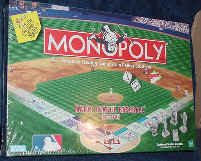 Here again,
the mechanics vary a bit, since some of these sport games are more a variation
of a known mechanic, but situated in the sport atmosphere. Before going in to
'real' sports games, just some examples of these kinds of 'sports spin off',
published just for the sportfans. How about Baseball Trivia Board Game (the old
Trivial Pursuit, with baseball questions only), Major League Baseball Monopoly
(yes, it really exist, see the picture on the right), NFL-Olopoly monopoly
(1994), Manchester United Football Trivia Game (1994). See also 'old games using
new atmospheres' below as well: I guess 'Dallas Cowboys vs Wash Redkins
TIC TAC TOE' (and the others games from this serie) beat pretty much everything
when it comes to clueless game developers.
Here again,
the mechanics vary a bit, since some of these sport games are more a variation
of a known mechanic, but situated in the sport atmosphere. Before going in to
'real' sports games, just some examples of these kinds of 'sports spin off',
published just for the sportfans. How about Baseball Trivia Board Game (the old
Trivial Pursuit, with baseball questions only), Major League Baseball Monopoly
(yes, it really exist, see the picture on the right), NFL-Olopoly monopoly
(1994), Manchester United Football Trivia Game (1994). See also 'old games using
new atmospheres' below as well: I guess 'Dallas Cowboys vs Wash Redkins
TIC TAC TOE' (and the others games from this serie) beat pretty much everything
when it comes to clueless game developers.
When it comes to sport games, there are also a lot of games that are relate to sports, but are not a sportgame itself (e.g. playing a manager of league/team etc.). As already said, many 'sport related' games have nothing to do with simulating the game, but not much more than just a marketing tool.
A few notable exceptions:
There are many good racing games, Formula De is propably one of the best ones though. Some specific ones are Circus Maxima (ancient charriot racing, Avalon Hill).
 Knizia did a good job
(apparently) on a fencing card game, called En
Garde (published by Abacus, 1994). Note that this game could easily be
converted to any 'contact' sport.
Knizia did a good job
(apparently) on a fencing card game, called En
Garde (published by Abacus, 1994). Note that this game could easily be
converted to any 'contact' sport.
Games based on football were created by Avalon Hill (Paydirt, 1981), 3M (Pro Football Game, 1967) and many others. A special one to mention here is Bloodbowl, a american football simulation set in the fantasy world of Games Workshop, played by orcs, undead, dwarfs and others.
Off course there are baseball games. A notable one is MLB Showdown (WotC/Hasbro), a collectable baseball card game. WotC combined a game with (maybe) highly collectable cards.
Tolkiens' 'lord of the rings' made a big impact on the atmosphere of games. Not just are there many games that carry names related to Tolkiens book (the most obvious one 'lord of the rings' by Knezia), but also Orcs, Goblins, Ogres, Halflings and Elves were used in games many times since then. Dragons & Dungeons, as released by TSR, but also complete battle systems (like Warhammer) carry Tolkiens races.
Typically, Warhammer is set in the Fantasy world of Tolkien. Games Workshop created complete worlds including background stories on the races and individual characters. Even more worse, some players created their own story and background of their armies and characters. I have seen collectors of GW miniatures, that even don't play game, but just fiddle around with the theme. They have complete armies, scenery, etc., but just don't play the game.
If you look at Bloodbowl, an game based on American Football between Orc, Elves, Dwarf, etc, the background stories and the atmosphere created are more fun than the game. The collecting bit (of getting your world completed) contributes to the fun. Ergo: especially in the Warhammer scene (well, actually the complete GW line of games), the theme is crucial. The theme is very simple: a wargame, but atmosphere created, in combination with the great look and feel of the miniatures really complete this game. In addition, their game descriptions come with load of stories: the bloodbowl 'Starplayer' add on is really fun to read.
Now for something completely differtent: we've seen bass based monopoly games, sex games (oh, no, not yet, see below), etc.: what else can there be? Here are some real existing atmospheres:
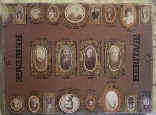 Heritage (1975) is a board / dice
game featuring genealogy as topic. I have no more information about this game,
but it's definetly no a theme I would have come up with.
Heritage (1975) is a board / dice
game featuring genealogy as topic. I have no more information about this game,
but it's definetly no a theme I would have come up with.
Cashflow 101 by Robert Kiyosaki is educational board game that teaches you the basic financial skills of sophisticated investors (that's what the add says). This game sells for $100-$200, comes with a video and a bunch of tapes. Often seen on Ebay. (btw, as I saw his site and studied economics, I can tell you, this guy gets rich only by selling overpriced games and books. If you really believe you can get rich by playing a game/reading a book by Kiyosaki, go here)
 Ever wanted to play
a shrink? Well, here is your chanc: "therapy, the game". Another game
in the catagory 'undefined. In the same catagory, how about a game covering
'mid-life crisis' (Game Works, 1982)?
Ever wanted to play
a shrink? Well, here is your chanc: "therapy, the game". Another game
in the catagory 'undefined. In the same catagory, how about a game covering
'mid-life crisis' (Game Works, 1982)?
There are various new age games. Besides Tarot, I-Tjing there are the many pendelum games (such as Occult Mystic Eye Game). I know, the games mentioned are very old, but apparently regained attention these last years. It should be noted that some people take these games seriously (maybe even as a threat).
Many games have been published by commercial organisations as part of their marketing activities. In general, don't expect to find a great game here. The good news is, they are usually for free (or at least, very cheap). More over, usually the game mechanics are (poor) copies of popular games, such as Trivial Pursuit, Monopoly or Snakes/Ladders. One notable exception is 'Business', as published by some Dutch companies, it's some kind of monopoly game with a twist.
A few examples (left to right) Budweiser, ABN/AMRO, TPG Group, C1000 ):


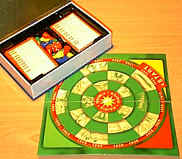

...... and many others.
It is striking to find that the quality of some of the games actually go in line with my perceived quality of the company that published the game..
In some cases, these games are part of the merchandise of the company (Coca Cola, Disney, etc.), and became a collecters item after a while. Most large cities, commercial sport clubs (football, baseball, etc.) usually also publish games as part of their marketing activities. One special atmosphere to note are the games that come with special events (such as Olympics at a certain place (e.g. Olympia (Olympic Games, Munich, 1972, published by Ravensburger)).
And then of course, there is sex, drugs and rock and roll. Typical examples of
games promoting drug/criminal activities are Dealer McDope (1970's)
and a few others. These are typical 'underground' games, often published in the
wild 70's, heavily criticizing public law and order.  Maybe
not really in this category, but many (political) scandals / crimes were also
'republished' in game-format, over the years. A typical example is 'Play OJ,
the Verdict', based on OJ Simpson's adventures (remember 1999/2000). In addition, should I mention
the many 'political' games based on the combination 'cigar' and 'Bill Clinton'?
As already mention, these games are 'underground' and usually poorly designed in
terms of look and feel as well quality of material.
Maybe
not really in this category, but many (political) scandals / crimes were also
'republished' in game-format, over the years. A typical example is 'Play OJ,
the Verdict', based on OJ Simpson's adventures (remember 1999/2000). In addition, should I mention
the many 'political' games based on the combination 'cigar' and 'Bill Clinton'?
As already mention, these games are 'underground' and usually poorly designed in
terms of look and feel as well quality of material.
And
then of course, there is sex: 'dr. ruth's game of good sex', partner link, stip
& strip, sexual fantasies (intutition, 70's). Did I mention Boobs (find
the a matching pair, see picture below)? And then of course there are a number of Playboy magazine
games (e.g. "the game of elegant lifestyles", 1986). Partner Link
is more of a Real Life Role Playing Game (and not something you play on a table
(well, thinking about it, you may want to play it on the table, eventually ... ;-)). 
In case you are wondering if there are any 'sexy' CCG's, yes, there is at least one: "xxxenophile: The card game". By the way, this game is designed by James Earnst of Cheapass (very well know game producer). It is apparently a good 'puzzle' game (note, this games only contains 'commons'). 'pornstar: uncut" is a cardgame in wich you play an 'adult movie' director (note: 'pornstar' is non-porno graphic, non-CCG). It's actually for free.
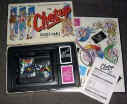 If you
like the real thing, but don't haven't got clue on how to get there, try picking
up some opening lines from a game called "chat up, the board game".
Other ones are '4-play' (a monopoly alike one, where money is not the issue),
erotic 'glow in the dark' dices (various editions, from 'soft' to 'hard'),
'fore-playing cards' with special instructions (1 couple I guess), the more
recent Girl Genius (available at cheapass),
'seduction' (game for 2 couples, 1966 by crea tek), 'talk dirty to me' (TDC
Games, sold as 'the most hilarious... etc.' but actually very, very stupid).
Should I mention the many 'dirty words/deeds' dice games?
If you
like the real thing, but don't haven't got clue on how to get there, try picking
up some opening lines from a game called "chat up, the board game".
Other ones are '4-play' (a monopoly alike one, where money is not the issue),
erotic 'glow in the dark' dices (various editions, from 'soft' to 'hard'),
'fore-playing cards' with special instructions (1 couple I guess), the more
recent Girl Genius (available at cheapass),
'seduction' (game for 2 couples, 1966 by crea tek), 'talk dirty to me' (TDC
Games, sold as 'the most hilarious... etc.' but actually very, very stupid).
Should I mention the many 'dirty words/deeds' dice games?
More games in this catagory can be found here, an add for a Jerry Springer game can be found there as well. And of course you will find a Sexual Trivia game here.
I left out all the soft & hard porn standard card game sets (available at any sex shop, I guess, in many variations).Below you see some older games from this catagory.
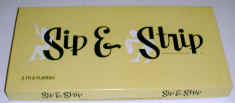
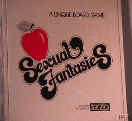
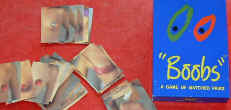
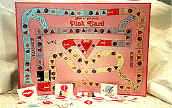 Another game is this catagory is propably 'The Pink
Game' (see picture), a gay/lesbian board game, some kind of trivia game on gay
history, culture including truth or dare mechanics. I also noticed that a number
of Barbie games are heavily marketed as 'gay'-games on Ebay (Ken is apparently
more popular in more scenes, than he ever thought of himself).
Another game is this catagory is propably 'The Pink
Game' (see picture), a gay/lesbian board game, some kind of trivia game on gay
history, culture including truth or dare mechanics. I also noticed that a number
of Barbie games are heavily marketed as 'gay'-games on Ebay (Ken is apparently
more popular in more scenes, than he ever thought of himself).
In addition there are many non-sexual games related to relationship, such as 'men are from mars, women are from venus' (typically a game with anwering and questions, while figuring out what other people answer given the various questions). They do not fall in this catagory as they are about relationships, but I didn't know where to them else.
Rock&Roll: how about 'Pass Out', a drinking board game. A monopoly like board where squares say "yellow player takes a drink", "all drink", "pass out card", "take a drink", etc. Mmm, I know a lot of ways to get drunk in a better way. Also there a lot of more faster and games, if the objective is getting drunk. I bet there are a few games out on mariuana, but then again, I'm not a part of that scene, so I can't come up with one.
In general, these games in this catagory are published in a small batches, usually lousy quality (hey, you can't expect MB, AH or Parker to produce these kind of games). The only exception I know is Partner Link (and its extensions). The quality of printing / box is very good and (surprisingly) sold in toyshop (at least here in the Netherlands, top shelf). But then, this game is intended for (heterosexual) couples only (apparently a mass market as the Internet age limits natural fantasy I guess).
|
|